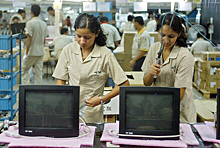The IMF: Making A Difference — Lending

Factory in Manaus, Brazil (photo: Evaristo/AFP)
Brazil: Helping Calm Financial Markets
November 21, 2007
- In 2002, Brazil's economy was suffering from lingering fiscal and current account problems, contagion from the crisis in neighboring Argentina, and the prospect that economic policies would be significantly altered after the elections.
- An IMF stand-by arrangement helped restore confidence and stabilized the economy.
- Low inflation, narrowing income disparities, and reduced poverty are among the many achievements of recent years.
In mid-2002, Brazil was on the brink of a crisis, brought on by fears about economic policy changes that might follow the presidential election. A loan from the IMF, the largest ever made by the institution, helped calm financial markets.
In the run-up to the presidential election in October 2002, Brazil's economy came under pressure as financial markets worried about lingering fiscal and current account problems, the crisis in neighboring Argentina, and the prospect of a left-leaning candidate winning the elections. The likelihood that Luis Inácio Lula da Silva might win the election caused substantial capital outflows, as markets worried that existing market-friendly economic policies could be overturned.
A helping hand
In September 2002, the IMF announced a 15-month stand-by credit of SDR 22.8 billion (about $30.4 billion) to support Brazil's economic and financial program through December 2003. In making the announcement, then IMF Managing Director Horst Köhler noted that "the new program will contribute toward ensuring the maintenance of sound economic policies. In this regard, the commitment that the leading presidential candidates has given to the core elements of the program already appears to have helped market confidence. As the next government builds on progress achieved with this macroeconomic policy framework, Brazil could be expected to progressively regain market access."
Brazil's economic and financial situation improved significantly following Lula da Silva's election victory. The country's new government pursued policies that were both prudent and courageous, combining fiscal and monetary discipline with critical initiatives to relieve poverty.
To allay concerns over debt sustainability, the government increased the primary surplus target (that is, excluding interest payments on government debt) from 3¾ percent of GDP to 4¼ percent of GDP, while the central bank undertook a proactive interest rate policy to guide inflation back to the target under the program. Moreover, the government adopted key structural measures—including pension and tax reforms and the adoption of a new bankruptcy law—that paved the way for equitable and sustainable economic growth.
The resulting increase in policy credibility led to a substantial narrowing of sovereign bond spreads that had skyrocketed during 2002. When international financial markets became more volatile in the spring of 2004, the government's efforts to reduce vulnerabilities paid off. Higher international reserves, improvement in the structure of domestic public debt, and a swing to current account surpluses helped limit the impact on Brazil.

Measuring the IMF's impact
Brazil overcame the challenges in 2002 through good policymaking and sound choices. The IMF's contribution was to help restore confidence so that the new government would have time to put in place its policy framework.
During a 2006 seminar titled "Who Needs the IMF?", the Brookings Institute offered this assessment of the IMF's assistance to Brazil:
"Consider, for example, the Fund's risky and creative lending package to Brazil in August 2002, when markets were terrified that the impending election of leftist President Luiz Inácio Lula da Silva would induce Brazil to cast aside its newly stable macroeconomic policies. With market access suddenly freezing up and the country on the brink of default, the Fund stepped in with $30 billion. The Fund's loan arguably helped avert a meltdown that would have slammed global markets from Manila to Istanbul, and forestalled the benign period that emerging market economies have enjoyed the past few years."
Brazil's economy today
Today, the Brazilian economy is reaping the benefits of the continued implementation of strong stabilization and social policies, in the context of a favorable external environment.
Real GDP growth is projected to rise from 3¾ percent in 2006 to 4½ percent in 2007. The inflation outlook remains benign, with 12-month inflation expected at around 4 percent by year-end. Strong social policies have recently helped place Brazil among the high ranking countries in the UN Human Development Index.
